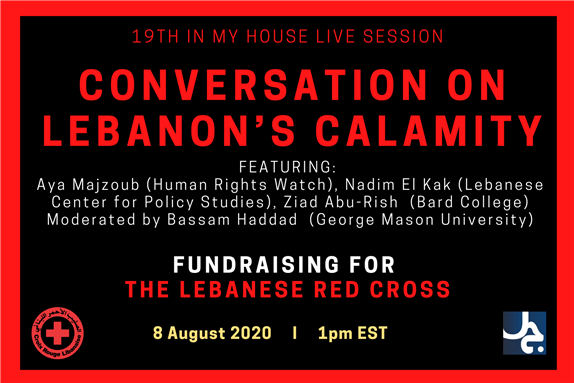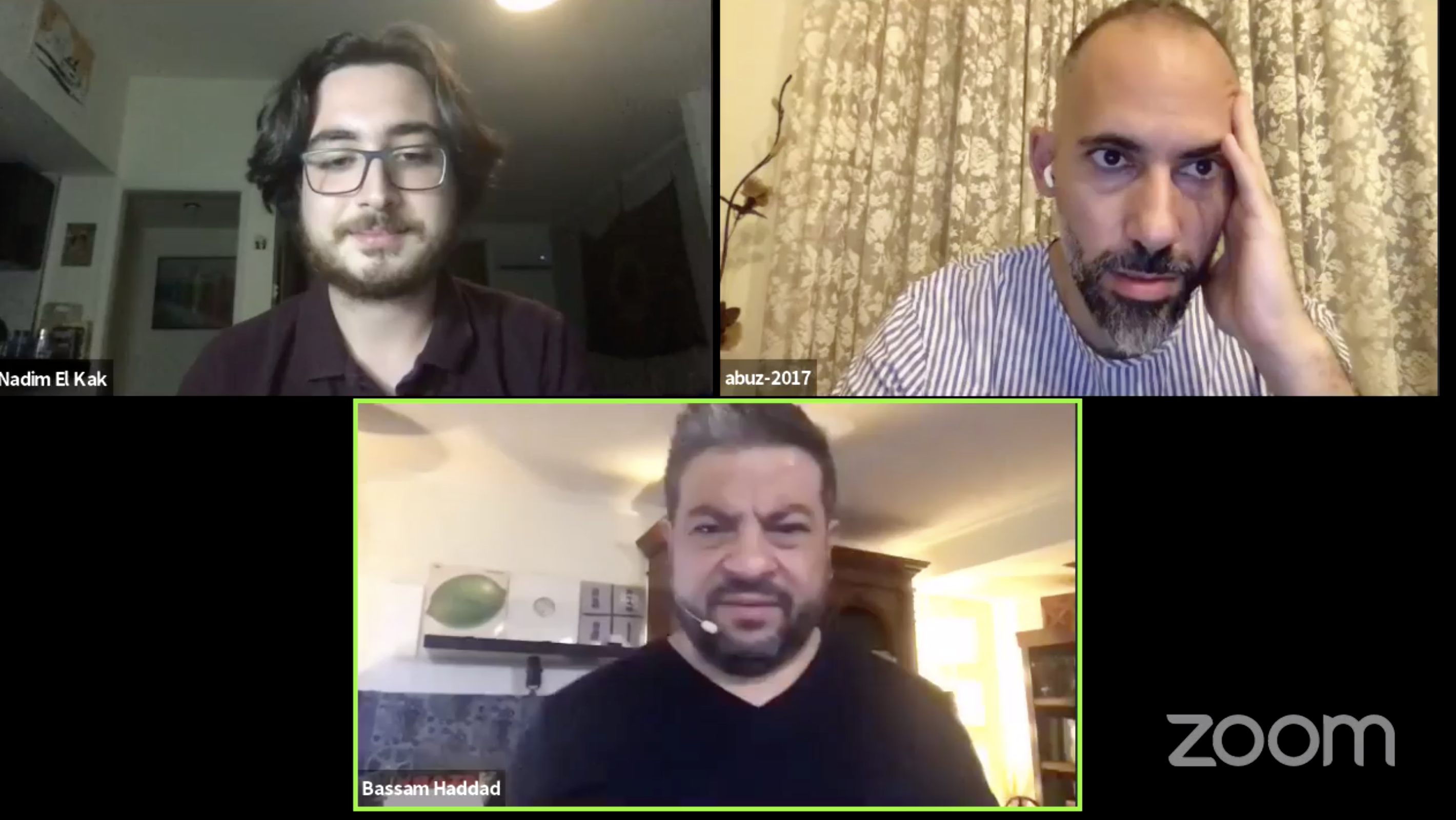On 8 August 2020, as tens of thousands of protesters took to the streets in Beirut, the 19th In My House Live Session hosted a “Conversation on Lebanon” between Ziad Abu-Rish (Jadaliyya and Bard College), Nadim El Kak (Lebanese Center for Policy Studies), and Aya Majzoub (Human Rights Watch)—all of whom are based in Beirut—and moderated by Bassam Haddad (Arab Studies Institute & George Mason University). The conversation sought to highlight what is known about the nature, extent, and effects of the Beirut port explosion on 4 August 2020. The discussion also provided updates on relief efforts, the political fall out, ongoing protests, and potential developments.
The live virtual event also served as a benefit fundraiser for the Lebanese Red Cross, one of the primary organizations on the ground in Beirut providing rescue and relief efforts for those affected by the explosion as well as providing medical attention to those in need during the protests. According to the Lebanese Ministry of Public Health, as of 8 August 2020, the explosion resulted in at least 153 deaths, 6000 injuries, and dozens of missing persons.
Due to Aya Majzoub’s professional role, she was unable to join the entire event and instead called in as she was monitoring the protests and government responses to them. Her contributions to the event were invaluable and a testament to her efficacy as a researcher and reporter. Aya was later assaulted by members of the Lebanese military as part of the broader violent crackdown on protesters, journalists, and legal monitors. According to figures released by the Lebanese Red Cross and the Islamic Emergency and Relief Corps, at least 728 were injured during Saturday's protests, 153 taken to hospital and 575 treated on site.
[Click image to play video.]
[Click this Youtube link if you encounter any issues watching the Facebook Live video]
Donate to the Lebanese Red Cross Here
Panelists:
Aya Majzoub is the Lebanon and Bahrain Researcher at Human Rights Watch. She investigates a wide range of human rights abuses in both countries and conducts national and local advocacy. Prior to joining Human Rights Watch, Majzoub was the Deputy Head of Digital Investigations at the Commission for International Justice and Accountability, where she investigated war crimes in the Middle East and built criminal cases against high-level perpetrators implicated in the violation of international criminal and humanitarian law. Majzoub holds an M.A. in Middle Eastern Studies from Harvard University and a B.A. in Politics, Psychology, and Sociology from the University of Cambridge.
Nadim El Kak is a Researcher at the Lebanese Center for Policy Studies (LCPS). He is trained in Political Science and Middle Eastern Studies at Amherst College and is currently a Graduate Fellow at the American University of Beirut’s Sociology program. His research focuses on the connections between sectarian politics, social movements, and neoliberalism. Nadim also hosts the Alternative Frequencies podcast, covering Lebanon’s ongoing crises.
Ziad Abu-Rish is Co-Director of the MA Program in Human Rights and the Arts, and Visiting Associate Professor of Human Rights, at Bard College. He is a 2020–21 American Druze Foundation Fellow in the Center for Contemporary Arab Studies at Georgetown University. His research explores state formation, economic development, and popular mobilizations in the Middle East, with a particular focus on Lebanon and Jordan. Abu-Rish was previously Assistant Professor of History and Founding Director of the Middle East and North Africa Studies Certificate Program at Ohio University. He serves as Co-Editor of Arab Studies Journal and Jadaliyya, as well as Co-Director of the Middle East Studies Pedagogy Initiative (MESPI) and the Lebanese Dissertation Summer Institute. He is also a Research Fellow at the Lebanese Center for Policy Studies (LCPS).
Moderated By:
Bassam Haddad is Director of the Middle East and Islamic Studies Program and Associate Professor at the Schar School of Policy and Government at George Mason University. He is the author of Business Networks in Syria: The Political Economy of Authoritarian Resilience (Stanford University Press, 2011) and co-editor of the forthcoming book, A Critical Political Economy of the Middle East (Forthcoming, Stanford University Press, 2021). Bassam serves as Founding Editor of the Arab Studies Journal and the Knowledge Production Project. He is co-producer/director of the award-winning documentary film, About Baghdad, and director of the series Arabs and Terrorism. Bassam is Co-Founder/Editor of Jadaliyya Ezine and Executive Director of the Arab Studies Institute. He serves on the Board of the Arab Council for the Social Sciences and is Executive Producer of Status Audio Magazine. Bassam is Co-Project Manager for the Salon Syria Project and Director of the Middle East Studies Pedagogy Initiative (MESPI). He received MESA's Jere L. Bacharach Service Award in 2017 for his service to the profession. Currently, Bassam is working on his second Syria book tittled Understanding The Syrian Tragedy: Regime, Opposition, Outsiders (forthcoming, Stanford University Press).

